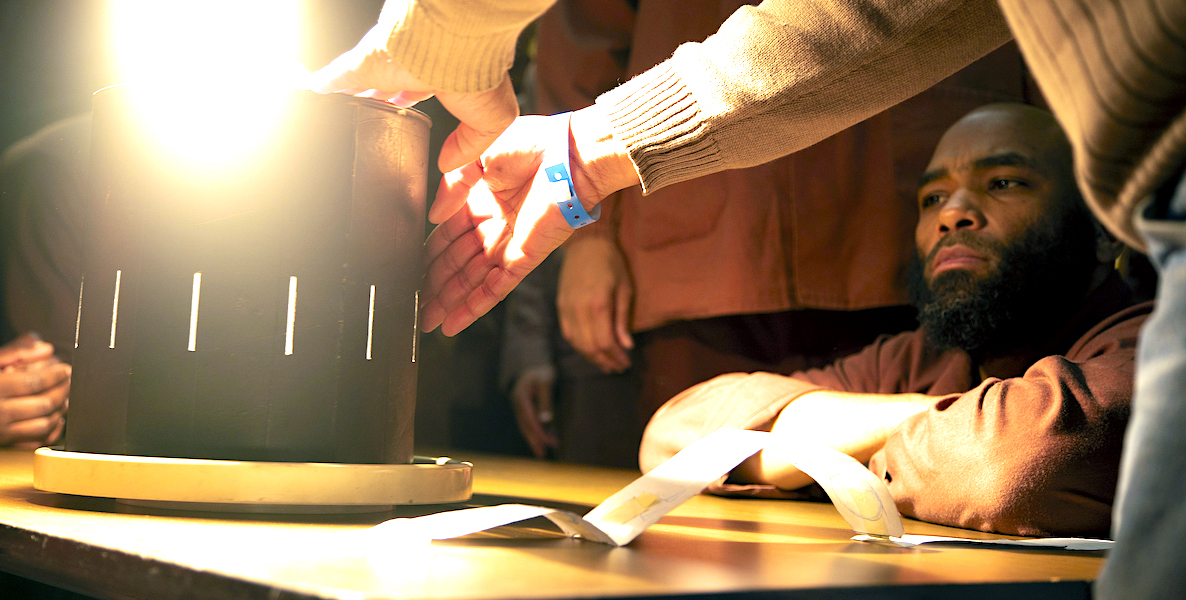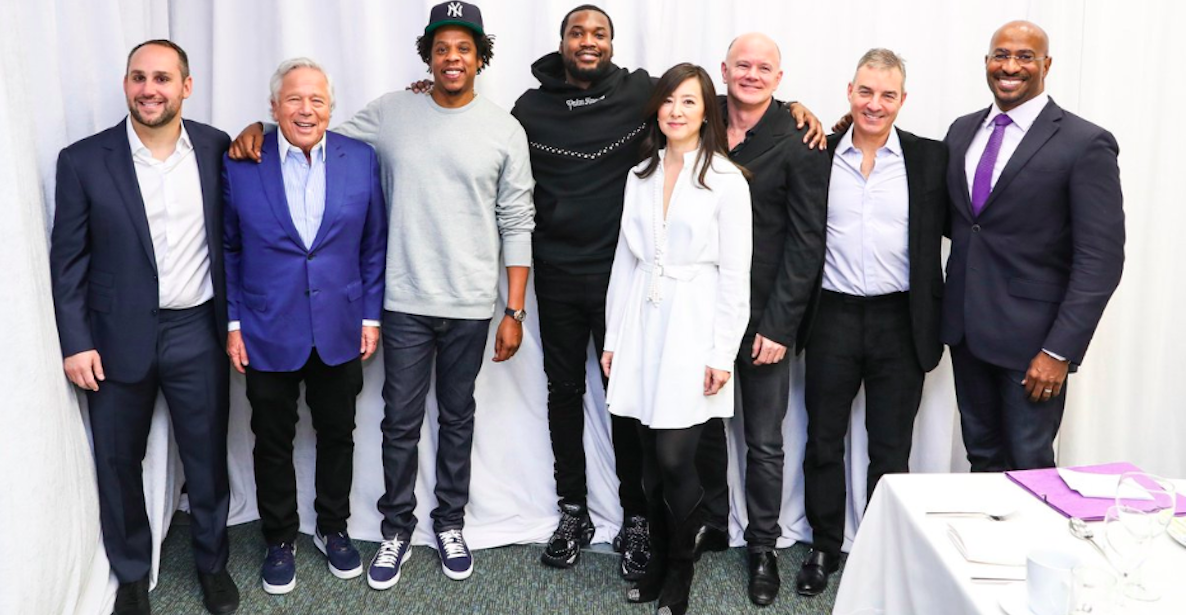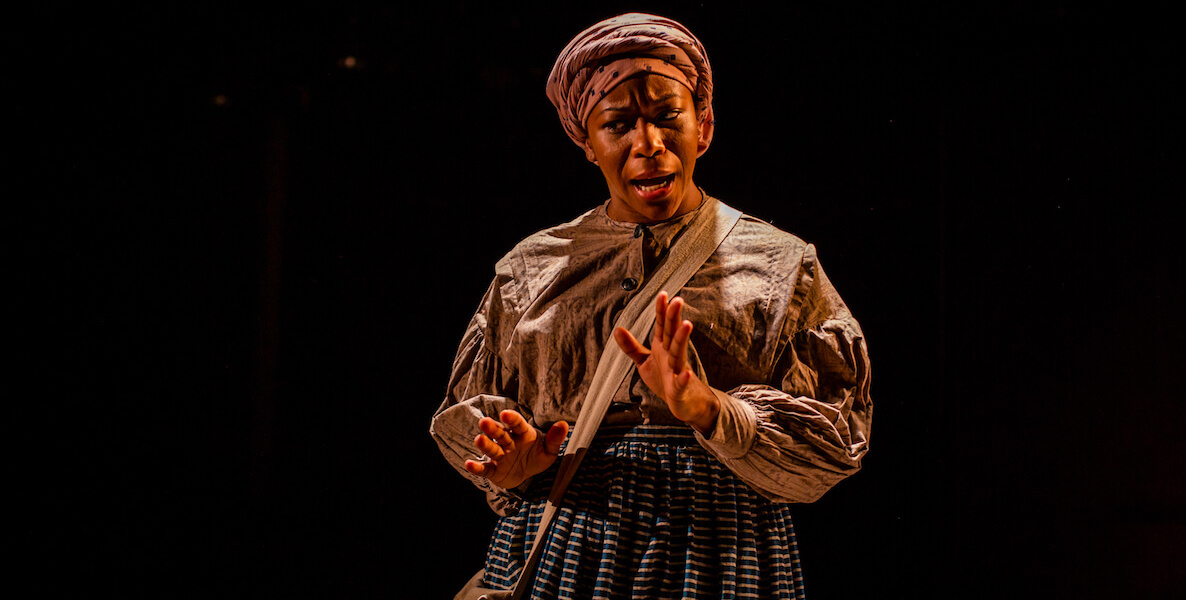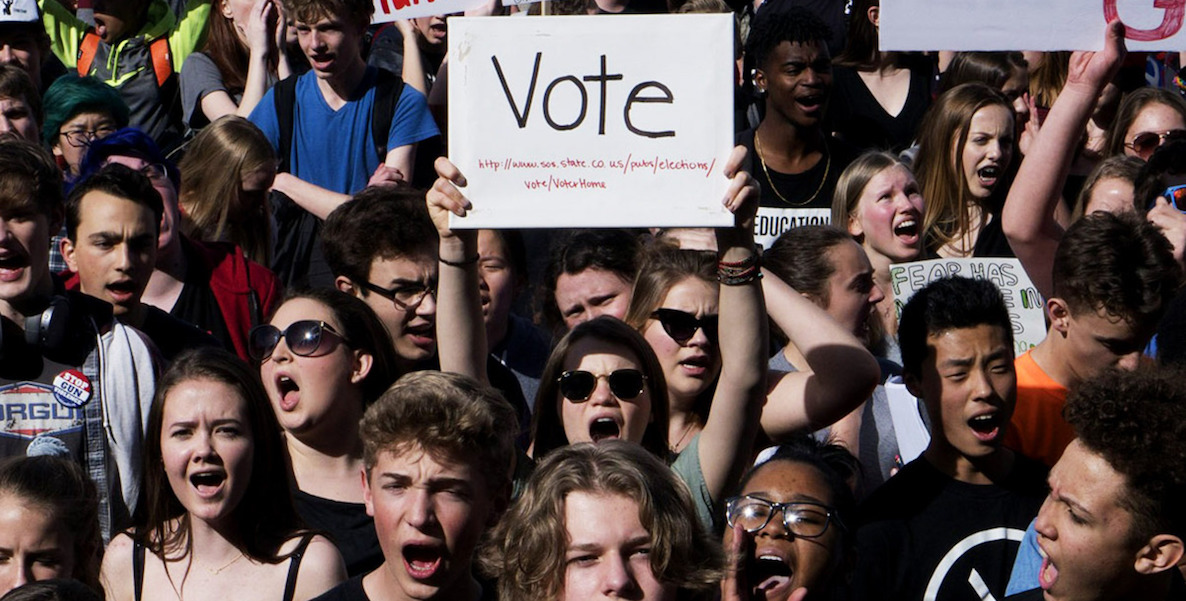This February, as schools roll out their Black History Month curriculum, educators will invariably discuss Harriet Tubman and the Underground Railroad.
But, even with the extra attention paid to the fact that 2020 marks her (probable) 200th birthday, it’s unlikely that they’ll address these other facets of Tubman’s extraordinary life:
![]() The raid at Combahee Ferry in 1863, which makes her the only woman to have led a major battle in the Civil War.
The raid at Combahee Ferry in 1863, which makes her the only woman to have led a major battle in the Civil War.
The question of why her marriage to John Brown really dissolved, and how her second marriage, in her 40s, was to a man 20 years her junior.
The seizures she regularly experienced as a result of a frontal-lobe trauma from her childhood.
Those overlooked experiences are precisely the ones that piqued the curiosity of acclaimed Philly author and Penn professor Lorene Cary, and led her to write her first play, My General Tubman, which is at Arden Theatre Company through March 15.
Here, she talks about being a rookie playwright, the wisdom that comes with female experience and how, if we look hard enough, we all have a General Tubman in our lives.
Jessica Press: You joke that, at age 63, you’re the “oldest rookie playwright,” but that makes you an incredible example to other women—as well as youth, and marginalized people of all backgrounds—that there’s no timeline for making a difference. Can you talk about that philosophy?
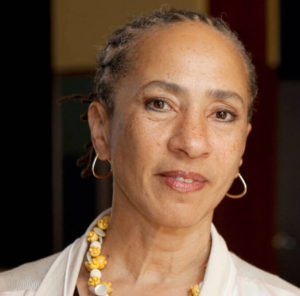
Lorene Cary: Well, I think experience is something I can speak about with more confidence than philosophy.
As a younger writer with really young children, I was always trying to figure out how in god’s name to split my attention—because both required a problem-solving that was kind of full-self. It required an intellectual, emotional, spiritual self.
I found some article—I wish I had kept it—that talked about the careers of people who were on everybody’s American must-do syllabus when I was a young person—the people I read: Hemingway, Fitzgerald.
The article said that all of these people wrote their first, their Young Guy—they didn’t say it at the time, but their Young White Guy—Books, which are an assertion of the self in a fictional way.
Then they said that often women, who cannot write their first major books until after their children are older, write different kinds of books. It comes from coming to a book with more age, more experience, more family, more overall vulnerability, more responsibility, and a different position in the culture, a different position in the society that requires other kinds of social capital.
There I was, thinking that there will never be a time when I would stop dripping from nursing. Ever. I was teaching at the university and somebody walked by with a baby crying and I had to cross my arms and say Ok, I think that’s enough there, let’s take a break shall we?
But that article, along with another about a woman whose name I can’t remember who became an appliance spokesperson in her 40s after her kids had grown, gave me hope and said to me that if your life goes on, if you’re careful, if you have energy, if you haven’t sort of screwed yourself by making stupid, short-sighted decisions in order to get readers fast with books that are not worthy of you or writing pieces that are clickbait, then you have a shot at what comes next.
JP: Speaking of resilience, change and dedication—what drew your attention to Harriet Tubman?
LC: Oh lots of things. But I want to segue to this part of her life, about her marrying her 20-something-year-old second husband when she was in her 40s.
That was one of the things that pulled me, like it’s something we don’t know, we don’t pay attention to the older Tubman.
We’re talking all the time about trauma, trauma; and sometimes to me, it feels like the trauma is a stand-in for the way we used to talk about dysfunction. Or kind of an update for our American fascination with black inferiority.
We don’t know what happened with her and John Brown. He wrote letters that indicate that he was expecting her help and she didn’t show.
Some biographies say maybe she was canny and realized it wasn’t going to work; others say it looks like maybe she was down there trying to recruit people.
Maybe she was ill—she had lots of illnesses from the time she was young, and had such horrible sickness in childhood. So we don’t know. I was really curious about that fact. What happened that she didn’t show?
I was really curious about the fact that we as a society generally have been much less interested in her Combahee River Raid, which is the only major Civil War military action that was led by a woman. There were no others in the Civil War led by a woman! We don’t tell that as part of her story, regularly.
There are special collectives of black women artists or activists who call themselves Combahee, but we don’t tell that story in school. We tell about the Underground Railroad, sneaking at nighttime, bringing them out one by one, two by two, seven or 10. But we don’t tell that other huge story.
So the three things were: Wait a minute, what happened with her and John Brown? What about Combahee? And then this other marriage? Like we’re not interested in that, for whatever reasons.
JP: Your show uses time travel as a device to draw some connections between slavery and today’s mass incarceration. How did taking that creative license allow you to address, or ask the viewer to address, important questions about our society and its structures?
LC: I’m getting more comfortable talking about Harriet Tubman and time travel, but it always seems so ridiculous. I don’t know why—I mean why I would write a whole play about it and then not want to say it? I don’t know.
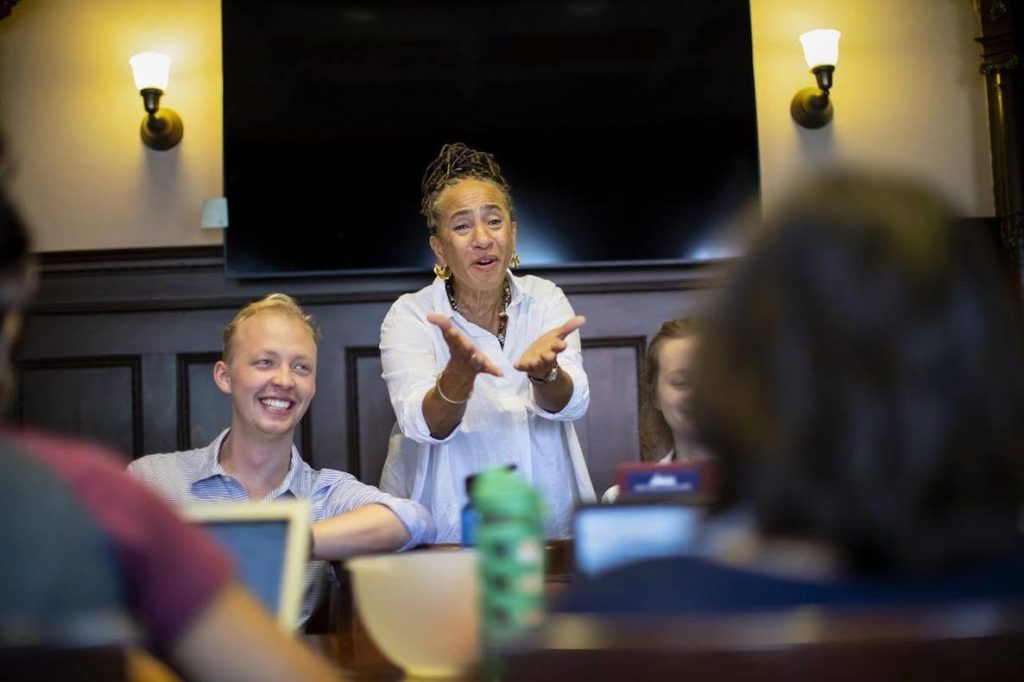
JP: Is that just a writer’s self-consciousness?
LC: Yeah, yeah, that’s all it is. I can’t think of a way to say it that captures it as a psychic metaphor, as opposed to just straight-up gimmick. I think that’s why.
To me it doesn’t feel like a gimmick, which is why I invoke drumming throughout, because so many cultures—on this continent, in Africa, in Asia—have used drumming as a spiritual practice—to call, to invoke, to bring our minds to consciousness of our ancestors.
Sometimes it’s straight up keep drumming until you go ecstatic and the ancestors have kind of come into you. Sometimes it’s really a matter of saying let’s empty our minds so that we can find ancestral wisdom that we need at the moment.
It’s all of these things.
And that’s how I envision it and also connecting it to the bits of African spirituality that African Americans brought to Christianity, which was Harriet Tubman’s great spiritual practice—and that she thought was what happened to her when she had these seizures.
![]() JP: Can you talk about the theme of trauma in the play?
JP: Can you talk about the theme of trauma in the play?
LC: We’re talking all the time about trauma, trauma; and sometimes to me, it feels like the trauma is a stand-in for the way we used to talk about dysfunction. Or kind of an update for our American fascination with black inferiority. So this is a way of saying ok, yes, yes, there’s been trauma.
Here’s some big-ass trauma for you: Let’s look at slavery trauma. Let’s look at the trauma of mass incarceration—which of course has everything to do with the governmental structures we [implemented] after slavery to continue to make sure that people were disenfranchised. But let’s look at that.
And when I say that, I don’t mean that everybody in prison hasn’t done things that deserve imprisonment. People do bad things and we have prison for that, I’m not being simpleminded. But I’m just looking at our structures.
So we have all this trauma that exists in the community and what happens with it? Tubman used her spiritual life to say when I got hit in the head, when I got temporal lobe epilepsy and when I had seizures, I heard music tumbling from the sky, I flew over towns and cities, and sometimes I was allowed to touch the mind of god.
And that let her say ok, so right now, right here, things are pretty effed up: What am I gonna, how can I do this?
Hence the repeated phrase in the piece How to make a way out of no way, which is sort of a black spiritual, but not only black people do it—every human being is trying to figure out how to do that. Some of us have hope that it’s possible.
JP: What can Philly do in reaction to the work you’re presenting?
LC: You know, the call to action is way different from creating a thing of beauty that uses these ideas. And everybody, it’s called My General Tubman because all of us have a different General Tubman. So what are you called to do?
I didn’t write this until some years after I spent a year and a half teaching in a detention center—those opportunities are available, people can do it and it changes utterly, utterly the way you think about incarceration.
The first thing she does [in the show] is she put one of her crazy salves on the cut of this guy who’s been brought wrongly into prison. So for some people, the first step is self-healing. A lot of times we just go out to the world and we say ok I’m going to make everything [better]. But for some people it’s about healing themselves.
It could be about figuring out what are your skills, what’s your character, what’s your temperament, what do you have to give? And where are you going to give it? Is it policy and structure? Is it you as a young person thinking to yourself, wait a minute, I can and I must participate in governance, I gotta do something about this?
For other people it will be figuring out how to do some of what Philadelphia has done more than some other cities [insofar as] our DA’s office and how are we going to influence it?
I didn’t write this until some years after I spent a year and a half teaching in a detention center—those opportunities are available, people can do it and it utterly, utterly changes the way you think about incarceration.
For other people it’s preventive and it means working on everything having to do with education issues. Because every child who is not educated adequately is more vulnerable to incarceration and every other ill and every other trauma in society.
![]() And you can also just read about it. We can educate ourselves. And then you know better, you do better.
And you can also just read about it. We can educate ourselves. And then you know better, you do better.
JP: Do you have plans to present the show to youth or bring high schoolers in?
LC: One of the reasons that they adreded an extra two weeks [to the schedule] is to get in 10[am] shows because they had so many requests from high schools. So they were really responsive to that.
JP: Speaking of youth, what’s the latest with Vote That Jawn, the initiative you started to rally youth to register to vote?
LC: The latest is a 2020 reboot. This month we’re having a roundtable with partners, and then on March 25, we’re gonna have something called Trend That Jawn, to get youth voter trending.
We’d like to pack the Kelly Writers House [at Penn] with young people who will share content, create content. We also are going to have remote locations, for groups who can’t make it there. And we’ll do an event in September.
We’re also talking to the city commissioners about their project to get new designs for the I Voted Today button stickers—we’d like to figure out how to do an Instagram of all the submissions, since they’ll only be choosing two. I think there will be lots of wonderful entries, and we’d love to do them in many languages.
JP: Anything else you want to make sure viewers know going into the show?
LC: I guess I feel passionate about this whole new play-development process, which is collaborative at a level that makes me feel like yes, I’m a playwright, but I’m a totally augmented writer of this story.
So I come to these people with this story and James Ijames, the director, Michele Volansky, the dramaturg, and all of the cast members met every day from 10 o’clock in the morning until 7 o’clock in the evening with a break for a lunch/supper thing. They met and they rehearsed it, they discussed it, they workshopped it, they tried like hell to say things that weren’t written well enough.
And then I went back and rewrote almost every night or morning for that month. So they absolutely, they’re the first audience and they’re like this huge editor crew. I feel so indebted to them for that.
JP: There you are—ever grateful, ever humble.
My General Tubman plays through March 15 at Arden Theatre Company, 40 N. 2nd Street. Get your tickets here.
This interview has been edited and condensed.
Header photo courtesy Wide Eyed Studios



